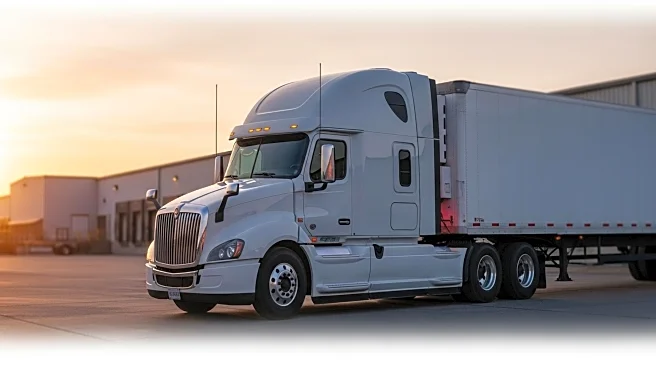What is the story about?
What's Happening?
The U.S. trucking industry is experiencing significant challenges due to labor shortages, economic pressures, and trade policies. A survey by Tech.co revealed that 69% of freight businesses are struggling to meet demand due to driver shortages. However, experts like James Peoples Jr., professor of economics at the University of Wisconsin—Milwaukee, suggest that the issue may be more about retention than an actual shortage. The industry is also facing a 'freight recession' as demand has fallen since the post-COVID boom, according to Stephen Burks, a former truck driver and professor at the University of Minnesota. Additionally, tariffs on medium and heavy-duty trucks, set to take effect in November, are expected to increase production costs for domestic manufacturers, further complicating the business environment.
Why It's Important?
The trucking industry is crucial to the U.S. economy, handling nearly three-quarters of the nation's freight by weight. The current challenges could lead to increased costs for goods and impact supply chain efficiency. The tariffs on trucks are intended to support U.S. producers but may lead to higher prices due to increased production costs. The industry is also facing potential disruptions from automation and AI, which could replace nearly half of the nation's truck drivers within a decade. These developments could reshape the industry, affecting employment and operational strategies.
What's Next?
The trucking industry may need to adapt to new technologies and policies to overcome current challenges. Automation and AI could offer efficiency improvements, but they also pose risks to employment. The industry must navigate these changes while dealing with economic pressures and trade policies. Stakeholders, including trucking companies and manufacturers, will need to assess their strategies to remain competitive and sustainable in the evolving market.
Beyond the Headlines
The introduction of automation and AI in trucking could lead to significant shifts in employment and industry practices. While these technologies offer potential efficiency gains, they also raise ethical and social concerns about job displacement. The industry must balance technological advancements with the need to support its workforce and maintain economic stability.















